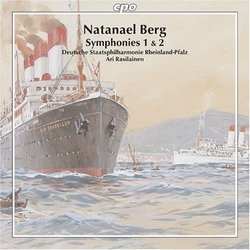| All Artists: Natanael Berg, Ari Rasilainen, Rheinland-Pfalz Staatsphilharmonie Title: Natanael Berg: Symphonies Nos. 1 & 2 Members Wishing: 0 Total Copies: 0 Label: Cpo Records Original Release Date: 1/1/2009 Re-Release Date: 3/31/2009 Genre: Classical Style: Symphonies Number of Discs: 1 SwapaCD Credits: 1 UPC: 761203732425 |
Search - Natanael Berg, Ari Rasilainen, Rheinland-Pfalz Staatsphilharmonie :: Natanael Berg: Symphonies Nos. 1 & 2
 | Natanael Berg, Ari Rasilainen, Rheinland-Pfalz Staatsphilharmonie Natanael Berg: Symphonies Nos. 1 & 2 Genre: Classical |
Larger Image |
CD Details |
CD ReviewsNatanael, not Alban, Berg -- a Different Kettle of Fish J Scott Morrison | Middlebury VT, USA | 04/13/2009 (4 out of 5 stars) "Who is Natanael Berg, you ask? Well, he was a Swedish composer (1879-1957) roughly contemporary with and a close friend of the better-known Kurt Atterberg and Ture Rangström. Like his fellows, he worked as a non-musical professional rather than make a living as a musician. He was a military veterinarian who took care of the Crown's horses. Although he grew up in an intensely musical household he was largely self-taught as a composer. I first heard some of his music on a Sterling CD (nla) conducted by Stig Westerberg; it contained his Fourth Symphony which I quite liked. This disc contains his first two symphonies.
These symphonies are alike in that they are more or less extended tone poems with clear narrative or pictorial content. The First Symphony (1912-14), subtitled 'Alles endet was enstehet' -- roughly, 'Everything new must end', the motto taken from a poem by Michelangelo and familiar as one of Wolf's Three Michelangelo Songs -- is a four-movement work whose individual movements represent the first years of life, the birth of love, life's joy, and mature life's serenity and the approach of death. Berg's brilliance as an orchestrator and creator of memorable melodies is on display here. Unfortunately his harmonic sense relies rather too much on the kind of diminished sevenths, particular in low registers, that have come to be associated with inexpert movie music, which of course this music predates. Still, there is plenty in this symphony to respond positively to. The Second Symphony (1916), subtitled 'Årstiderna' ('Four Seasons'), came two years after the First and represents some development of Berg's skills. The first movement, 'Spring', is a sprightly waltz which also contains a love song. 'Summer' positively conveys bright sunshine, a feature of Berg's Respighian orchestration, by means of splashes of brass and wind color against high string trills. 'Autumn' ushers in storms that arise out of low brass chords and percussion accented by woodwind lightning and blowing winds in the rushing strings. 'Winter' is quiet and spare, almost Sibelian, with resignation and even a degree of inner peace. This symphony may not be the most original statement on the passing seasons but it is evocatively effective. Berg's style is unabashedly tonal and not even as chromatic as that of, say, Richard Strauss. His music falls squarely within the early post-Romantic fold even though his works were written in the second decade of the twentieth century. At a distance of one hundred years, of course, this is of little importance. What matters is that this is, on the whole, enjoyable, well-made music. And it is nicely played by the Deutsche Staatsphilharmonie Rheinland-Pfalz under Ari Rasilainen who seems to be making a career of resurrecting late Romantic and early post-Romantic orchestral works, to our great benefit. Scott Morrison" |
